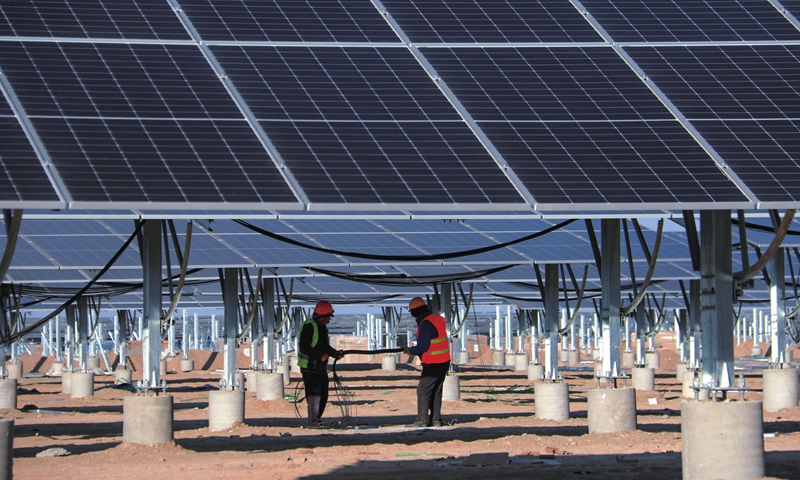
Workers help build a 40-megawatt solar power project in a photoelectric industrial park in Dunhuang, Northwest China's Gansu Province on December 11, 2021. The city has over recent years taken advantage of its bountiful wind and solar resources to push for the development of the local new energy sector, beefing up its green economy. Photo: cnsphoto
More government stimulus policies are expected to land in May and June, possibly including a special Treasury bond issuance that may echo the one the government issued in early 2020 to fight COVID-19, as China ramps up fiscal support for a slowing economy.China's State Council, the cabinet, on Monday rolled out a comprehensive package of measures to support various aspects of the Chinese economy, including support for automobile consumption, home buying and small businesses, in the latest move to ensure that the Chinese economy returns to a normal track and keep it operating within a reasonable range.
The support measures, designed for the current complex, challenging economic environment, will play a positive role in stabilizing industrial and logistics chains, and provide strong assistance and support for troubled enterprises, especially smaller firms, and boost consumption, experts noted.
The clearly targeted measures of the State Council cover six aspects of the country's economic fundamentals, ranging from improving the operation of smaller businesses, and boosting consumption and investment, to stabilizing industrial and supply chains to accelerate work resumption.
Lian Ping, head of Zhixin Investment Research Institute told the Global Times on Tuesday that more targeted policies are expected to come out soon to instigate domestic demand, shoring up smaller businesses, and stabilizing the labor market.
On Monday, the State Council has stressed more support for smaller firms and those hit hard by recent COVID-19 outbreaks by doubling the amount of inclusive finance for smaller firms, increasing government tax rebates by over 140 billion yuan ($21 billion), and extending loans for smaller enterprises and individual businesses.
In a bid to boost consumption and investment, the State Council called for increasing tax cuts for car buyers, encouraging certain home purchases and launching more water conservation projects.
With the new measures, a total of 60 billion yuan of taxes is expected to be waived from the purchase tax on some passenger vehicles in stages. The policies also signaled an easing of real estate curbs, encouraging different cities to form their own real estate policies to support home buying.
Lian said given the persistent downward pressure and fiscal resources earmarked for this year were all distributed, China may choose to issue new special treasury bonds to recuperate fiscal resources and the move could take place as earlier as in June.
In 2020, the Chinese government issued 1 trillion yuan worth of special treasury bonds to help fight the economic impact caused by the virus.
Domestic news portal eeo.com reported that value of the new special treasury bond issuance could reach up to 2 trillion, citing an economist from Guangzhou-based Yuekai Securities.
A continued push in infrastructure is among supportive measures announced on Monday, following an executive meeting of the State Council. The country will kick off a new batch of water conservation projects, covering large-scale irrigation projects, transportation projects, renovation of old residential areas and underground utility tunnels.
The meeting also stressed the need to stabilize supply chains, smooth cargo logistics and cancel travel restrictions from low-risks areas, while gradually adding domestic and international flights.
Lian said that industry regulators, local governments and financial institutions are hammering out details to get the new policies through the administrative pipeline, and he expected more detailed measures to be announced to shore up sales of durable goods, such as autos. Lian added such policies, which might include the loosening of the auto sale curbs in big cities, to come out in the second quarter or the third quarter this year.
Ren Zeping, an economist, suggested the government dole out consumption vouchers on a mass scale and aggressively steps up infrastructure construction in order to make up lost economic output in April and May amid COVID resurgences with accelerated work and production resumption in the third quarter.
Announced tax and fee cuts, as well as reduction of rents and the extension of loans also needs faster implementation to shore up market participants, Ren wrote in his blog on Tuesday. "If you keep the green mountains, you won't be afraid of no firewood."
These policies are mainly designed for the current complex economic environment, with a large policy intensity and wide range of policy support that covers both the supply and demand sides, Zhou Maohua, a macroeconomic analyst at Everbright Bank, told the Global Times on Monday.
"It is expected that the policies will offer a boost to the transportation, logistics, automobile, real estate, infrastructure, energy and agricultural industries," Zhou said.
Global Times
